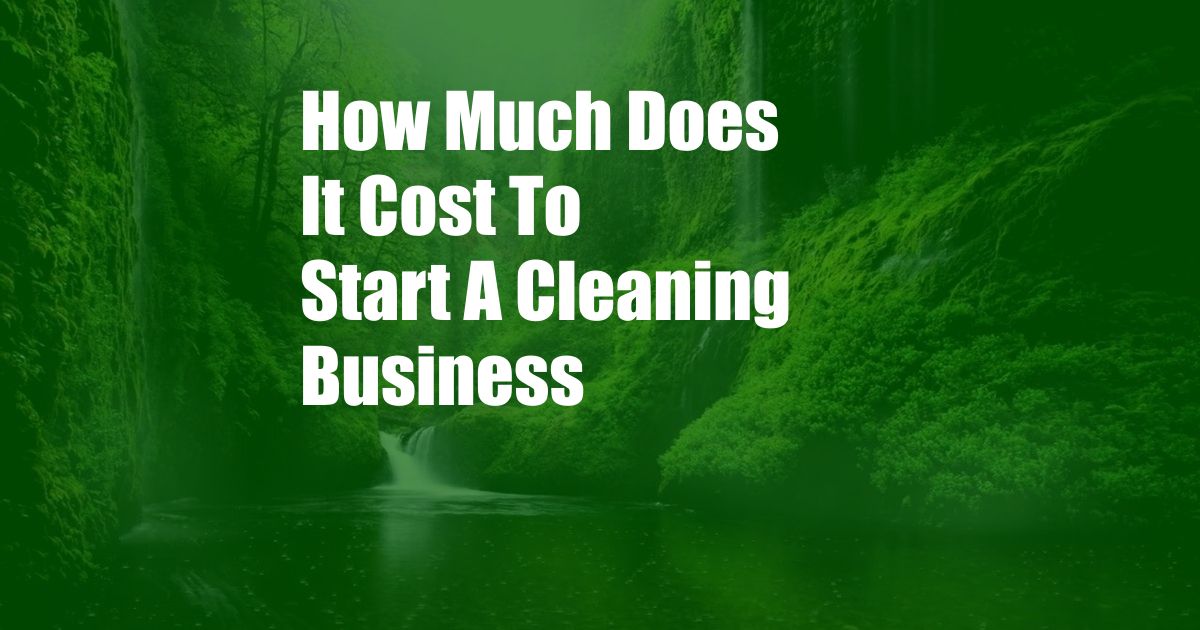
How Much Does It Cost to Start a Cleaning Business?
Are you ready to start a cleaning business and embark on a rewarding entrepreneurial journey? Whether you’re a seasoned professional or a cleaning newbie, understanding the startup costs is crucial for a successful launch. By considering the essential expenses and planning your budget accordingly, you can set yourself up for long-term financial stability.
Equipment and Supplies
The heart of your cleaning business lies in your equipment and supplies. From vacuums to mops, brooms to cleaning solutions, these essentials are indispensable. The cost will vary depending on the size and scope of your business. Basic equipment, such as a vacuum cleaner and cleaning supplies, can cost around $500-$1000. For a more comprehensive setup, including commercial-grade equipment, you may need to invest $2000-$5000.
Marketing and Advertising
To attract clients, you need to spread the word about your new business. Marketing and advertising can help you reach potential customers and establish a presence in your target market. Create a website, design business cards, and consider online advertising or social media marketing. These promotional efforts can range from $500-$2000, depending on the scope and duration of your campaigns.
Insurance and Licensing
As a business owner, protecting yourself and your clients is paramount. Insurance policies, such as general liability and workers’ compensation, provide coverage for accidents, injuries, or damages. Licensing requirements may vary depending on your location, and fees can range from $100-$500. Additionally, consider bonding your business for added peace of mind and credibility.
Vehicle and Transportation
If you plan to offer mobile cleaning services, a reliable vehicle is essential. Whether you purchase a new or used vehicle, factor in the cost of the vehicle itself, insurance, and maintenance. Depending on your needs, vehicle expenses can range from $5000-$20000.
Employee Expenses
If you plan to hire employees, expect additional expenses such as wages, payroll taxes, and employee benefits. The number of employees and their compensation packages will impact your overall labor costs. To stay competitive, research industry benchmarks and consider offering competitive wages and benefits.
Contingency Fund
Unexpected expenses are a part of running any business. Set aside a contingency fund to cover unforeseen circumstances, such as equipment repairs, emergency supplies, or unforeseen delays. A contingency fund provides a financial cushion and ensures you have the resources to handle unexpected situations.
Expert Advice for Budget-Conscious Entrepreneurs
Starting a cleaning business doesn’t have to break the bank. Here are some expert tips to help you optimize your startup costs:
- Consider part-time operations: Start small by offering part-time services while maintaining your primary income source. This allows you to test the waters and build your client base without significant financial risk.
- Negotiate contracts and pricing: Be strategic about your pricing and negotiate favorable terms with suppliers and vendors. Research industry rates, consider your target market, and bundle services to maximize profitability.
- Utilize cost-effective marketing: Social media platforms, local community groups, and word-of-mouth marketing can be effective and affordable ways to promote your business.
- Explore shared spaces or equipment rentals: If you don’t need a dedicated workspace, consider renting hourly shared spaces or equipment on an as-needed basis to reduce overhead costs.
Frequently Asked Questions
- Q: What is the average startup cost for a cleaning business?
A: The startup cost can vary depending on the size and scope of your business, but a range of $5000-$20000 is a reasonable estimate.
- Q: Do I need a license to start a cleaning business?
A: Licensing requirements may vary by location, but it’s generally advisable to check with your local authorities to determine any applicable licensing requirements.
- Q: How can I save money on startup costs?
A: Some cost-effective options include starting part-time, negotiating contracts, utilizing social media marketing, and exploring shared spaces or equipment rentals.
- Q: Is it possible to start a cleaning business with no money?
A: While it’s challenging, it’s not impossible. Starting part-time with minimal equipment and relying on word-of-mouth marketing can help you minimize initial expenses.
Conclusion
Starting a cleaning business involves various expenses, but with careful planning and consideration, you can set yourself up for success without breaking the bank. By understanding the essential costs, exploring cost-effective options, and staying informed about industry trends, you can build a thriving cleaning business that meets the needs of your clients and ensures financial stability for years to come.
Are you ready to start your own cleaning business and make a difference in your community? Take the first step today and turn your cleaning passion into a profitable enterprise.